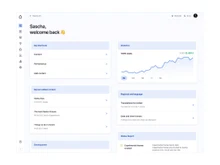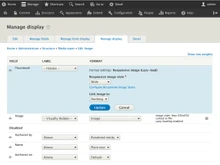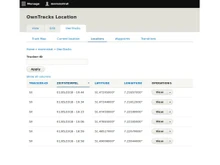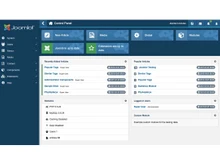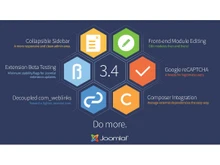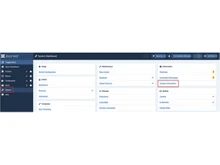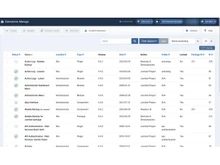How are Drupal and Joomla Different?
Drupal is a developer-focused, highly configurable content management software that is utilized by big businesses, governments, and websites with high traffic. It is appropriate for technically complicated websites since it provides taxonomy, custom fields, extensive content organization, and fine-grained user permissions.
Joomla is a well-known CMS that strikes a mix between usability and flexibility. Joomla is well-liked by independent contractors, small and medium-sized enterprises, and non-developers who want a working website without requiring much technical knowledge. Its robust admin interface, modular architecture, and numerous built-in extensions are much talked about.
Comparison Table: Drupal vs Joomla
| Comparison of Drupal and Joomla |
| Feature |
Drupal |
Joomla |
| Ease of Use |
Steep learning curve |
More intuitive for beginners |
| Customization & Flexibility |
Extremely flexible (developer-focused) |
Highly customizable (less technical) |
| Content Management |
Advanced content types & fields |
Built-in content features & modules |
| Extensions & Modules |
40,000+ modules (community-supported) |
8,000+ extensions (official directory) |
| Performance & Scalability |
Enterprise-grade scalability |
Good for mid-size projects |
| Security |
Very strong (used by governments) |
Good, but fewer enterprise controls |
| SEO & Marketing Tools |
Requires add-ons/custom setup |
Strong built-in SEO tools |
| Multilingual Support |
Built-in, highly flexible |
Also built-in, easier to configure |
| Community & Support |
Developer-heavy global community |
Active forums + easier documentation |
| Pricing |
Price On Request |
Price On Request |
Detailed Feature Comparison of Drupal vs Joomla
- Ease of Use & Learning Curve: Joomla provides an easier-to-use interface from the start. Basic site setup may be completed with little code thanks to its user-friendly admin panel. Although more capable, Drupal is more suited for people with technical expertise or development teams due to its high learning curve.
- Customization & Flexibility: Drupal is a developer's paradise. Complete control over the storage and display of data is made possible by its support for custom entities, views, fields, and content processes. Although Joomla allows for customization through templates and modules, it falls short of Drupal in terms of logic-driven development and structured content.
- Content Management: Both platforms are excellent at managing content, but Drupal is better for complex sites because it offers more sophisticated configuration options for user roles, taxonomies, and content kinds. Joomla provides content editors and site administrators with innovative capabilities for articles, media, and categories.
- Extensions & Add-Ons: Joomla boasts a user-friendly extension catalog that contains thousands of ready-to-use plugins, themes, and modules. Drupal makes extensive use of its open-source community modules, which are more robust but frequently call for developer support or manual configuration.
- Performance & Scalability: Drupal is the go-to for enterprise-level applications due to its performance optimization, caching, and ability to scale across large infrastructures. Joomla performs well for small to medium-sized websites but may need optimization or third-party tools as traffic scales.
- Security & Compliance: Security is a key strength of Drupal, which is why it’s trusted by government and financial institutions. The platform regularly releases security updates and supports role-based access control at a granular level. Joomla is secure too, but not built for the same level of compliance out of the box.
- SEO & Marketing Tools: Joomla includes basic SEO settings like meta tags, SEF URLs, and redirects without additional plugins. Drupal requires modules like Pathauto and Metatag for similar SEO control, but offers deeper customization for marketers and content strategists.
- Multilingual & Localization: Both CMSs offer strong multilingual capabilities. Drupal provides more flexibility in structuring multilingual content and user interfaces. Whereas Joomla offers simpler configuration options for multilingual sites through its Language Manager and content associations.
- Community & Support: Drupal’s developer-centric community contributes rich documentation and modules, but support typically requires technical knowledge. Joomla’s community is more accessible for less technical users, and its forums and tutorials are beginner-friendly.
Joomla vs Drupal: Pricing
Both Drupal and Joomla are free and open-source. However, Drupal typically incurs higher setup and development costs due to its complexity and need for developer resources. Joomla is more cost-effective for small businesses or solo users who want to manage their own site without hiring a full dev team. Both the CMS software offer pricing plans on request. You can reach out to our Techjockey Team for further product-related queries.
Which is Better—Drupal or Joomla?
Your ultimate decision depends on your project scope and technical expertise. If you require a highly configurable, secure, and scalable CMS for complex online applications, government projects, or enterprises, go with Drupal. For small to mid-sized websites, blogs, or e-commerce applications with lower technical requirements, Joomla is a good choice because it is easy to use and adaptable. Drupal is the industry leader in long-term, high-performance digital infrastructure. Joomla excels in terms of ease of use, flexibility, and speed of setup.
Still Not Sure Which CMS to Choose?
Talk to our CMS Experts at Techjockey and get tailored advice based on your website goals and technical needs.


 11 Ratings & 11 Reviews
11 Ratings & 11 Reviews




